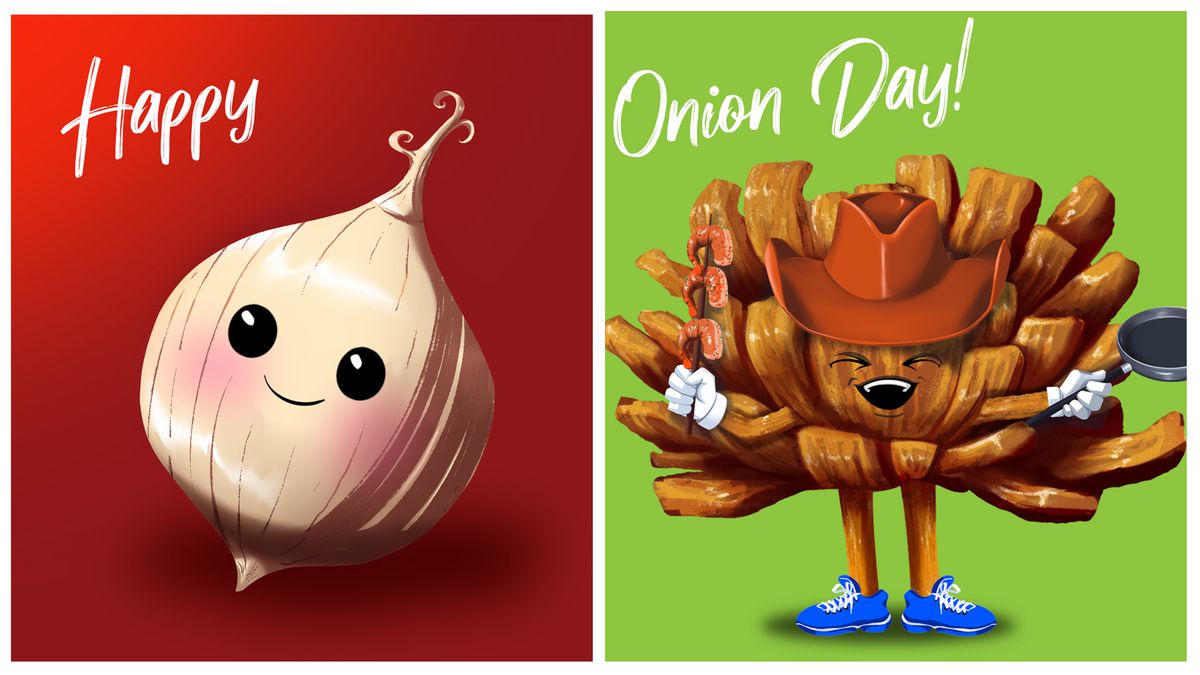The baby onions are adorable, tiny little buds with big, shiny eyes. The teenage onions have props and a bit more personality, with their stalks tousled in different hairstyles. The adult onions are fully bloomed, with deep-fried petals fanned wide.
That’s the life cycle of a Bloomin’ Bud, the name given to Outback Steakhouse’s first series of non-fungible tokens, or NFTs. Outback, the flagship brand of Tampa’s Bloomin’ Brands restaurant group, gave out more than 8,000 free digital images June 23 in one of the company’s first big swings in metaverse marketing. Customers could redeem the NFTs for a free Bloomin’ Onion and two Dr. Peppers when the onions “bloomed” on June 27: National Onion Day.
They were gone in 20 minutes.
“It was never intended to be about promotions or discounts or offers,” said Bloomin’ Brands chief marketing officer Danielle Vona. “It was intended to be, how do we engage audiences in this platform that we know are young, sports-oriented, college sports fans? How do we engage people in that and be relevant in that space?”
Outback is far from the first brand to launch NFTs featuring artwork of its products; McDonald’s, Nike and Coca-Cola all have their own uniquely identifiable digital tokens for collectors to purchase, trade and in some cases redeem. Outback’s Bloomin’ Bud experiment has, by early indicators, been a success for the company, one they plan to expand on this fall through paid partnerships with college athletes.
“For retail establishments like Outback, this is a pretty standard way of thinking about how they might use NFTs,” said William Luther, an associate professor of economics at Florida Atlantic University. “The primary benefit to them is the publicity or the advertising value that comes with launching this NFT.”
In the weeks since Outback began developing the campaign in March, the NFT and cryptocurrency industries have been hit by a wave of negative headlines about hacked wallets, stolen tokens and the plunging value of bitcoin and ether. Studies have shown that NFTs can be damaging to the environment, given the amount of energy necessary to create and maintain them.
“It didn’t feel like were dipping our toe into those spaces in any way that would be concerning for the company or for the brand,” Vona said. “We didn’t have as much concern when those types of stories hit. Although we were watching them, and if we did see something that was dramatic, we could have made the change at any time.”
Once minted, NFTs can take on lives of their own. While Outback gave each one out for free, in order to trade or sell them on a platform like OpenSea, owners had to pay transaction fees, or gas fees, that worked out to a few bucks per Bud. That still left room for unpredictable value swings. OpenSea’s logs show recent trades valuing Outback’s NFT’s for $20, $30, $50 in ether, a cryptocurrency. One Bloomin’ Bud with rainbow waves and laser eyes sold June 25 for more than $430, going by the value of ether to U.S. dollars at the time.
Subscribe to our free Business by the Bay newsletter
Want more of our free, weekly newsletters in your inbox? Let’s get started.
The deal for the free Bloomin’ Onion and Dr. Peppers don’t expire, Outback said, so there is some real-world value to NFTs with unredeemed codes. Luther said programs like this could eventually evolve into something like a loyalty program.
“You could imagine a business having half-off Wednesdays for all NFT holders, and if that were the case, then you wouldn’t actually redeem the NFT at your visit to Outback like you would with a coupon,” he said. “You would just present it, but maintain ownership of it, and then whoever’s holding it could collect that reward as long as the offer is valid.”
Over the summer, Vona said Bloomin’ Brands will assess some of the data behind the project to see what worked and what didn’t in advance of the next NFT campaign, which will be tied to college football.
“It’s a very hot space right now,” Vona said. “Will it be the same in the fall? I don’t know, but we’re going to continue to work on it.”
By that time, the industry could look a lot different.
“It’s a strange space,” Luther said. “A lot of people will look at Outback issuing a non-fungible token and think, ‘That’s weird, that’s crazy, why would they do that?’ But they also sponsor a National Onion Day. Is that really any weirder?”
Economic Development Reporter
This site no longer supports your current browser. Please use a modern and up-to-date browser version for the best experience.
Chrome — Firefox — Safari — Edge

